Spy poisoning: Police Sergeant Nick Bailey named as officer injured with nerve agent
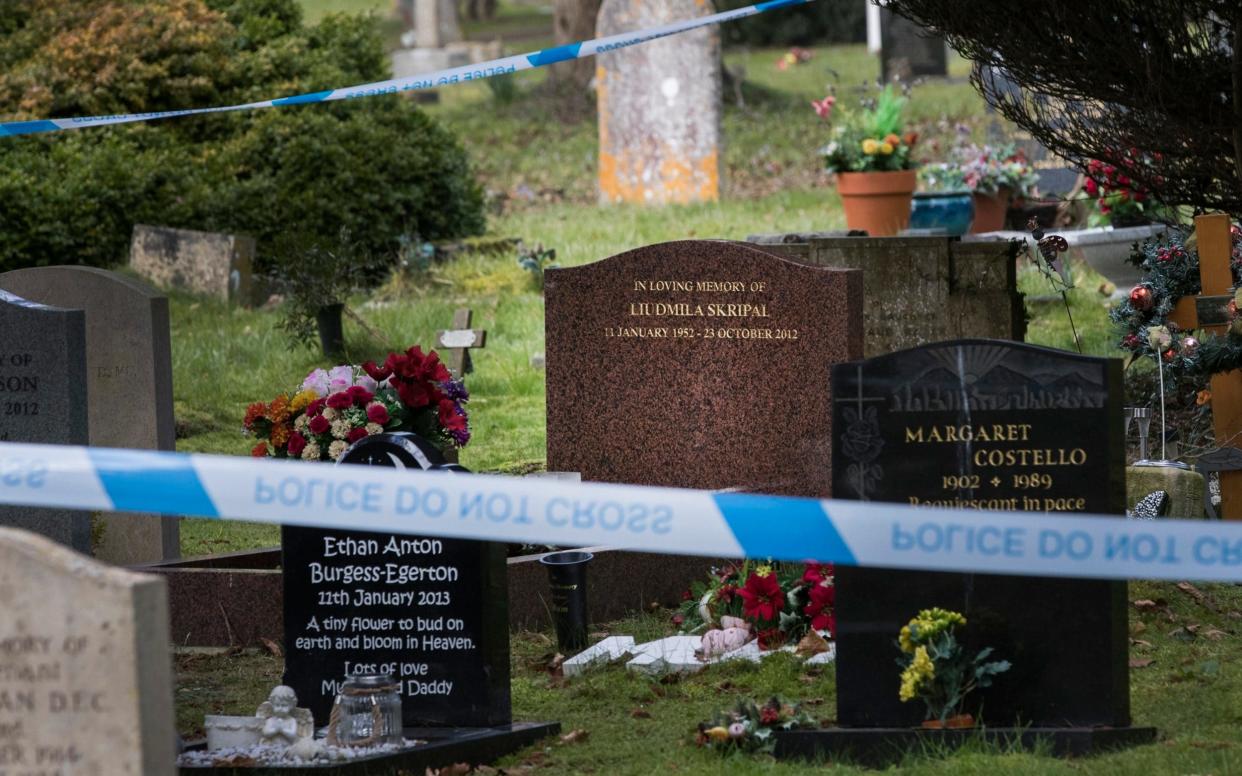
Police Sergeant Nick Bailey has been named as the officer who was injured with a nerve agent as he attended the scene where Sergei Skripal and his daughter Yulia were poisoned.
He was hospitalised after attending to the pair and is now thought to be awake and engaging with medical staff.
He was among the first to go to the aid of the pair, who were found slumped on a bench on Sunday afternoon.
The sergeant appears to be much-loved by his colleagues, many of whom paid tribute to their "courageous" friend.
Acting Chief Constable of the Wiltshire Police Force, Kier Pritchard, tweeted earlier today: "I have just left the bedside of our officer and family in hospital. Conveyed all our thoughts and wishes, an amazingly courageous officer."
Thank you for the huge number of messages of support for our injured officer in hospital. We all wish for a full and speedy recovery #proud
— Kier Pritchard (@wiltspoliceCC) March 8, 2018
Part of a cemetery where the wife of former Russian spy Sergei Skripal is buried has been cordoned off by police.
Officers were guarding London Road cemetery in Salisbury, Wilts, on Tuesday morning, when it was partly closed to the public and seal off with police tape. The cordon around the spy's house, some two miles away, has also been widened.
Questions have been raised about the deaths of both Col Skripal's wife, Luidmila, and his son, Alexander, following the attempted murder of the former double agent.
Mrs Skripal died of cancer in 2012 aged 59.
His son, who was 43, died in St Petersburg last July and is commemorated with a plaque at the cemetery.
It has been reported that both Col Skripal and his daughter, Yulia, who are now both fighting for their lives in hospital, visited the site last week, leaving flowers to mark what would have been Mr Skripal's 44th birthday.
A cemetery worker told The Mirror: "I recognised him. He regularly came to visit the grave and also his wife's grave. It's so sad."
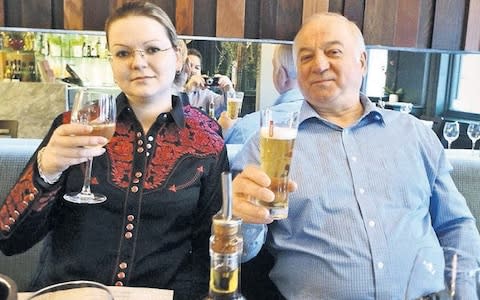
Meanwhile, Amber Rudd has promised to bring those behind the attempted murder of Col Skripal to justice “whoever they are and wherever they may be” as MPs accuse the Kremlin of a “brazen act of war”.
The Home Secretary described the poisoning of Col Skripal and his daughter as a “reckless” crime, adding that it was conducted in the “most cruel and public way”.
It came as former minister Sir Edward Leigh said the circumstantial evidence against Russia was "very strong", warning that if the Kremlin were implicated it would be an act of war aimed at “humiliating our country”.
Ms Rudd told MPs: “There will come a time for attribution and there will be, then, consequences and there will be further information that follows."
"The use of a nerve agent on UK soil is a brazen and reckless act. This was attempted murder in the most cruel and public way. People are right to want to know who to hold to account.
"But if we are to be rigorous in this investigation, we must avoid speculation and allow the police to carry on their investigation.
"We are committed to doing all we can to bring the perpetrators to justice, whoever they are and wherever they may be.
"The investigation is moving at pace and this Government will act without hesitation as the facts become clearer."
It comes after the Defence Secretary Gavin Williamson said Britain must put up a stronger front against Russian military aggression as he warned that "we are being pushed around" by the Kremlin.
As suspicions deepen over Russia's potential involvement in the poisoning, Gavin Williamson said that Vladimir Putin's regime posed an "ever-greater threat".
His warning comes after a police officer poisoned by a "very rare" nerve agent in Salisbury while going to the aid of Col Skripal and his daughter was said to be "talking and engaging" in hospital, according to the Home Secretary.
The targets of the attempted murder - Col Skripal, 66, and his 33-year-old daughter Yulia - remain in a serious condition in intensive care. They are understood to both be in comas.
However, an unnamed police officer who was hospitalised after attending to the pair is now thought to be awake and engaging with medical staff.
He was among the first to go to the aid of the pair, who were found slumped on a bench on Sunday afternoon.
The disclosure of the officer’s poisoning will add to growing pressure on the Government to take a hardline approach against Russia if state involvement is confirmed.
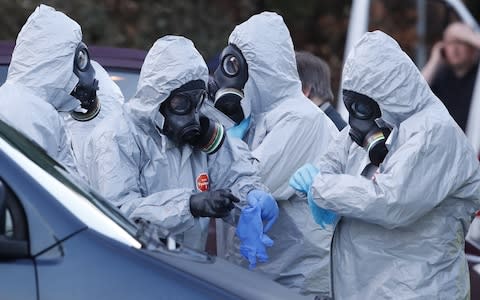
Listing examples of Russian aggression in eastern Europe and its involvement in the conflict in Ukraine, Mr Williamson added that there was an urgent need to counter the Kremlin's "increasingly aggressive stance".
"Russia's changing the way they actually fight and raise the level of conflict," he told BBC Radio 4's Today programme. "We are seeing this in the north Atlantic as well - the amount of submarines that are operating, there's a 10-fold increase in the last seven years.
"Russia's being assertive, Russia's being more aggressive, and we have to change the way that we deal with it because we can't be in a situation in these areas of conflict where we are being pushed around by another nation."
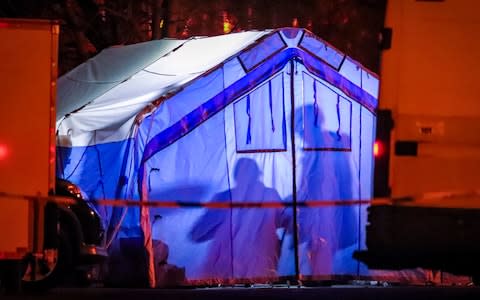
While Mr Williamson refused to say if he held Russia responsible for the attack in Salisbury, he described the attempted murder of Sergei Skripal and his daughter as "absolutely disgusting".
Police on Wednesday said government scientists had identified the nerve agent used by would-be assassins at a shopping arcade in the Wiltshire city centre. The chemical used is "likely to be rarer than Sarin or VX nerve agents", a source told the BBC.
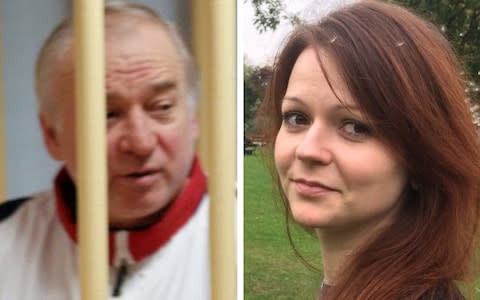
Ms Rudd said more details about the nerve agent would not yet be made public, but told BBC Radio 4's Today programme that it was "very rare".
PM: Poisoning is appalling and reckless crime
Downing Street said Theresa May was being kept updated by officials on developments in the Salisbury case.
The Prime Minister's official spokesman said: "It's clear that this was an appalling and reckless crime and the public will rightly want those responsible to be identified and held to account.
"But it is important that we avoid speculation and allow police and others to rigorously establish the full facts.
"As the Home Secretary and Foreign Secretary have made clear, our response to those found to be responsible will be robust."
The spokesman said Mrs May sent her personal thanks to police and emergency workers for their courage in responding to the incident, and also wished to thank the people of Salisbury.
Poisoned police officer 'talking and engaging'
The poisoned police officer was initially treated in hospital as a precaution and then discharged, but his condition deteriorated and he was readmitted on Tuesday and taken into intensive care.
On Thursday morning, Ms Rudd disclosed that the officer is no longer critically ill.
She told ITV's Good Morning Britain: "I've spoken to Mark Rowley this morning. The two targets are still in very serious condition, the policeman is talking and is engaging so I'm more optimistic for him, but it's too early to say. This is a nerve agent, we are still treating it as very serious."
Asked if she was hopeful for the police officer, she said: "Indeed, hopeful, but it's still very serious." She added: "He is not in intensive care, but it's a serious situation."
Video: Amber Rudd gives update on poison victims
Boris Johnson, the Foreign Secretary, earlier described the events as “very troubling”. He said: “If this does turn out to be in any way the result of hostile activity by another government, or directed, led, by another government, then the people of this country can be absolutely sure that the UK will respond robustly.”
Ms Rudd declined to say whether she regarded Russia as responsible for the Salisbury attack, but said the Government will put a plan in place to respond when the culprit is identified.

"When we have all the evidence of what took place, we will - if it is appropriate - attribute it to somebody," the Home Secretary told BBC Radio 4's Today programme.
"If that is the case then we will have a plan in place. We need to be very methodical, keep a cool head and be based on the facts, not rumour."
Video: Sergei Skripal days before he was poisoned
Ms Rudd added: "Let me be clear, we are absolutely robust about any crimes committed on these streets of the UK. There is nothing soft about the UK's response to any sort of state activity in this country.
"You may not hear about it all, but when we do see that there is action to be taken, we will take it."
Nerve agent 'rarer than Sarin or VX'
Hundreds of detectives, forensic officers and analysts are working on the case, which has drawn comparisons to the poisoning of former Russian intelligence officer Alexander Litvinenko on British soil in 2006.
A key focus will be working to uncover the origin of the nerve agent.
The BBC reported that a source familiar with the investigation said it was "likely to be rarer than Sarin or VX nerve agents".
Nerve agents, which are chemical weapons, have been used in assassinations and attacks in war zones in recent years.
Kim Jong-un's half-brother Kim Jong-nam was killed at an international airport in Malaysia last year in an attack using a nerve agent known as VX.
Another well-known nerve agent, Sarin gas, killed more than 90 people in a rebel-held area in Khan Sheikhoun, Syria, drawing international condemnation of the Bashar Assad regime.
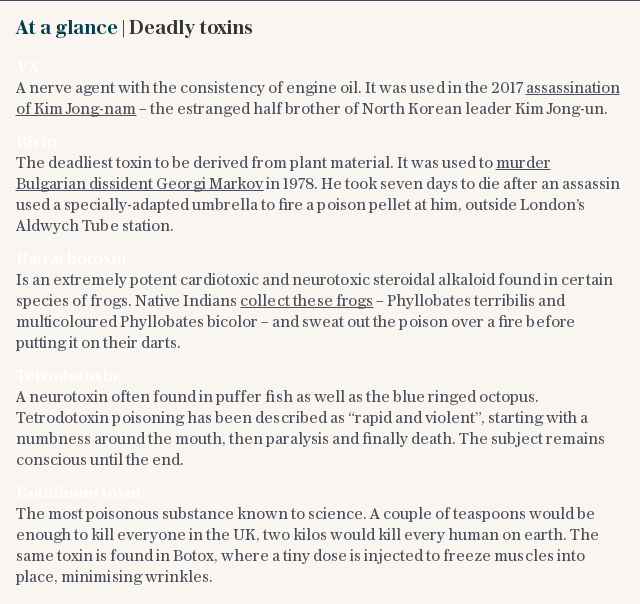
Access to such toxins are tightly regulated, meaning the Salisbury plot would have taken considerable planning to execute.
Hamish de Bretton-Gordon, a former commanding officer of Britain's Joint Chemical, Biological, Radiological and Nuclear Regiment, told The Times: "This is not the stuff you can knock up in your back shed.
"It is quite challenging to make. The inference is that this has probably come from a major laboratory, probably state-run."
Police: Spy and daughter 'targeted specifically'
Assistant Commissioner Mark Rowley, the head of counter-terrorism policing, revealed on Wednesday that the incident was being treated as attempted murder and the pair had been "targeted specifically".
He declined to specify the nerve agent or how it was administered.
Mr Rowley said: "Having established that a nerve agent was the cause of the symptoms, leading us to treat this as attempted murder, I can also confirm that we believe the two people who originally became unwell were targeted specifically.
"Our role now of course is to establish who is behind this and why they carried out this act."
Video: Mark Rowley's statement outside Scotland Yard
Mr Rowley reiterated his appeal for anyone who was in Salisbury city centre on Sunday to come forward to help with the "missing pieces" in the case.
Dame Sally Davies, the chief medical officer, said the incident posed a "low risk" to the public and advised that all the sites the pair were known to have visited had been "secured".
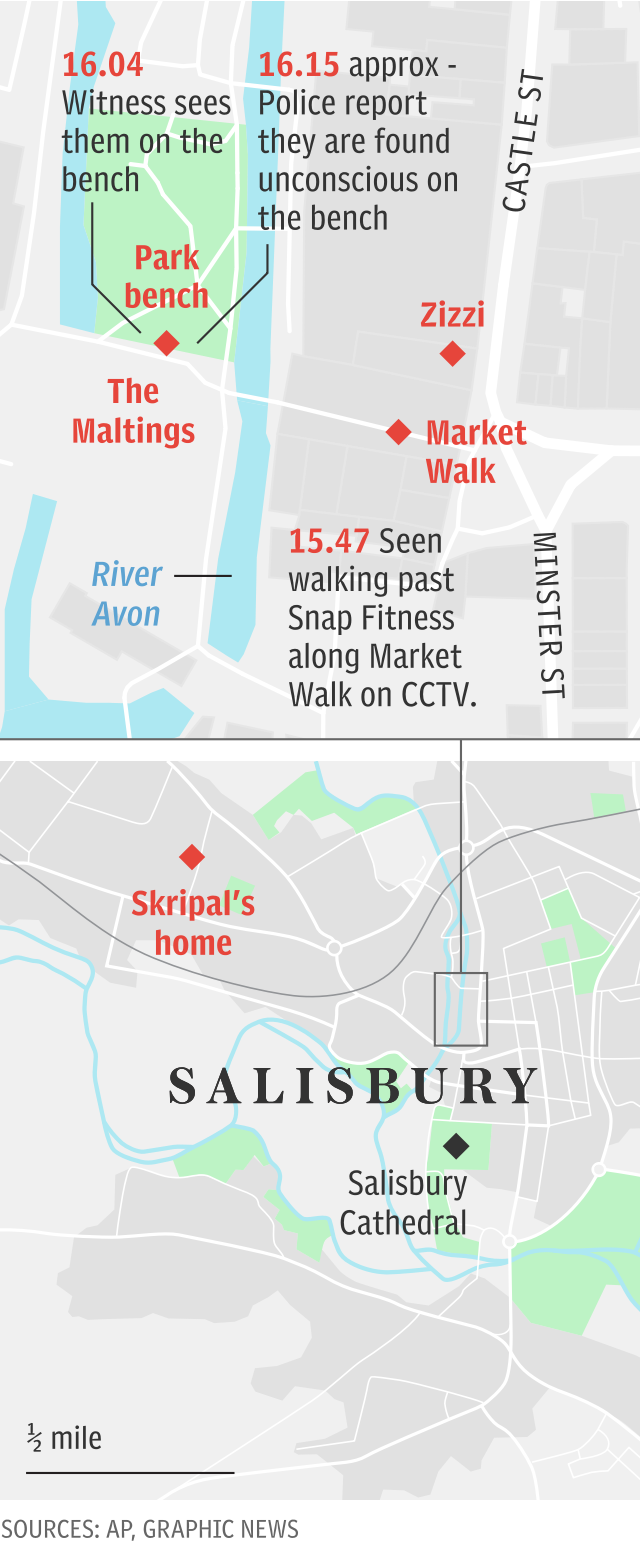
Russia denies responsibility for Salisbury attack
Russia has denied responsibility for the attack, which comes seven years after Mr Skripal was released from the country as part of a spy swap with the US.
He had been convicted in his home country in 2006 for passing state secrets to MI6.
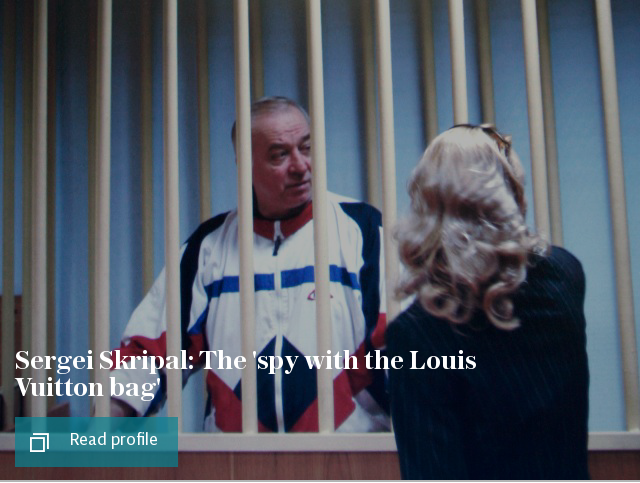
The investigation has triggered a diplomatic row and prompted crisis talks in Whitehall, but Ms Rudd said police must respond to "evidence, not to rumour".

